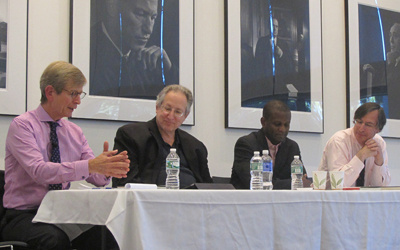BU Law celebrates Prof. Fleming’s new book with a Constitution Day symposium
Distinguished scholars from Yale, Columbia, and BU law schools attended to discuss Fidelity to Our Imperfect Constitution, published by Oxford University Press.

On Thursday September 24, 2015, Boston University School of Law hosted a symposium celebrating Professor James Fleming’s Fidelity to Our Imperfect Constitution: For Moral Readings and Against Originalisms. The event received a welcoming turnout from students, faculty, and administration.
Dean Maureen O’Rourke opened the event, introducing the work itself and Honorable Paul J. Liacos Professor of Law James Fleming. The commentators included BU Law’s Philip S. Beck Professor of Law Gary Lawson, Knight Professor of Constitutional Law and the First Amendment at Yale Law School Jack Balkin, and Vice Dean and Professor of Law at Columbia Law School Jamal Greene. The event was co-sponsored by the American Constitution Society and the Federalist Society.
Professor Balkin began by drawing the crowd’s focus to chapter four of Flemings book, stating that the “chapter alone is worth the price of the book.” He expressed the view that you can’t “cram everything into a theory of democracy” and agreed with Fleming’s view of deliberative autonomy—which Balkin would prefer to call “civil freedom.” Balkin pointed out that there are different modes of arguing about the Constitution, in which all arguments are forms of justification. He offered an analogy to Taylor Swift and Ryan Adams to conclude, expressing that although Swift and Adams have produced albums with identical songs and identical lyrics, the songs are entirely different because they come from two different perspectives. The substance of the songs change since each author interprets the lyrics differently.
Greene began his commentary by expressing how robust and expansive the literature on originalism is and questioned whether Fleming’s book is “an attempt to rehabilitate Dworkin.” He objected to the book, noting that it “imagines a perfect Constitution.” He explained, “you have to bite a theory at one point and ask whether the court has ever failed to issue a decision that failed to make the Constitution more perfect than it already is?” Greene added, “The court is never going to go beyond, in a progressive sense, what the project imagines.” Greene concluded that his conception of the Constitution as embodying abstract and moral principles through an empirical task of something to be discovered.
Professor Lawson began his commentary by posing the question, “Could Fleming be right this time?” Lawson explained the trick is to get the question right and acquiesced that as a matter of communication theory, Fleming “is right that Constitutional interpretation might cover that approach.” Lawson also drew the audience to the distinction between old originalism and new originalism. He related how old originalists did not talk about “concepts,” such as the philosophy of language, but rather talked about democracy and constraints, and that old originalism was not a theory of interpretation. Lawson further stated how Fleming’s project is “not a moral reading of the Constitution—a moral application would be better.”
Professor Fleming then defended what Ronald Dworkin refers to as a “moral reading” of the Constitution—the Constitution as a document embodying abstract and moral principles rather than one codifying concrete historical rules and practices. Fleming clarified that fidelity to the Constitution refers to honoring our abstract aspirational principles. He further noted that an originalist reading of the Constitution would enshrine an imperfect Constitution unworthy of fidelity. He affirmed that the Constitution provides for a framework of self-governance, and resisted the claim that “we are positivists doing history here.” Interpreting the moral principles, he stressed, requires normative judgments, rather than simply a historical understanding used to best discern the original meanings of the Constitution.